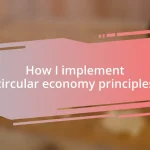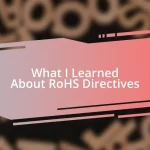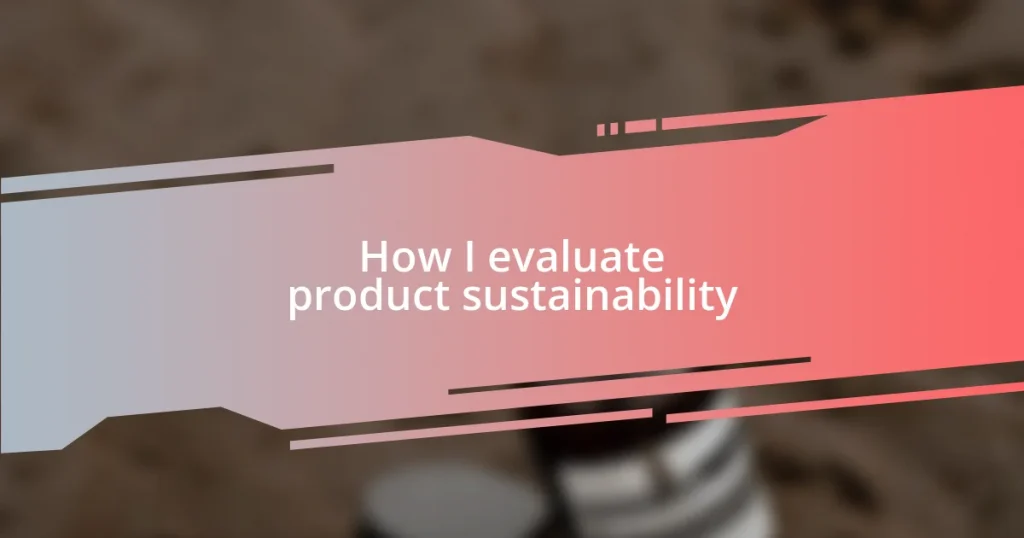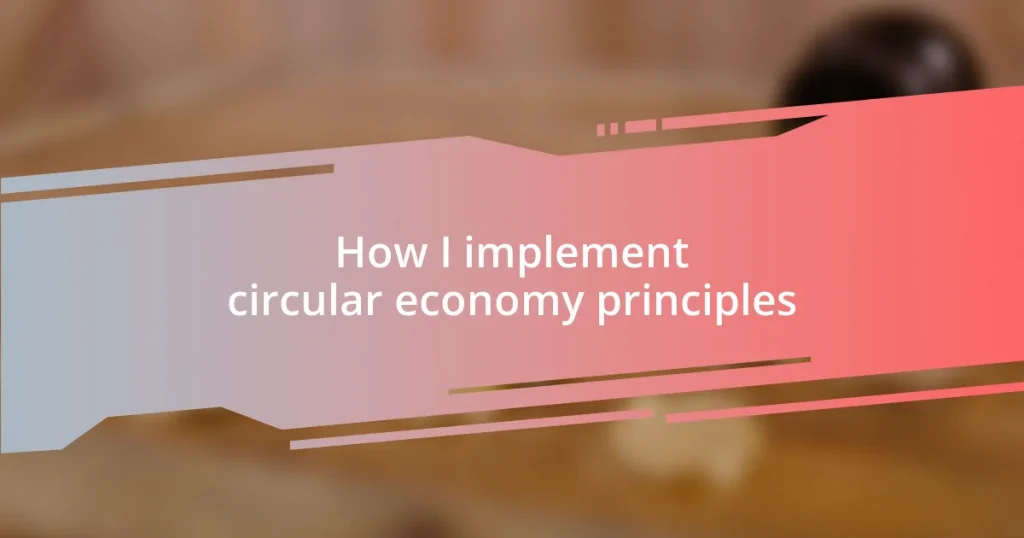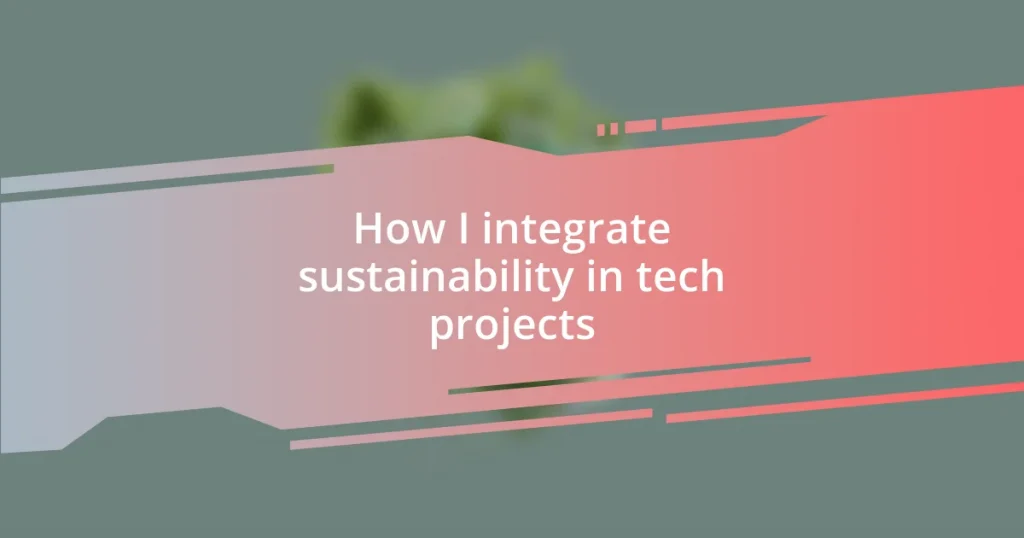Key takeaways:
- Staying informed about legislative changes is crucial for personal and professional impact, fostering a sense of empowerment and understanding of societal values.
- Identifying reliable information sources, including government websites, reputable news outlets, and professional associations, is essential for accurate insights into legislation.
- Engaging with professional networks and attending workshops enhances understanding and fosters connections, allowing for shared knowledge and practical strategies.

Understanding Legislation Changes Importance
Understanding legislation changes is crucial because they can have a significant impact on our daily lives. I remember when a new tax law was introduced; it felt overwhelming at first. The adjustments made to my financial planning were vital, and without keeping up, I could have missed out on important savings.
The emotional aspect of staying informed cannot be understated. I often think about how frustrating it would be to find out too late about changes that affect my rights or responsibilities. Fear of the unknown often accompanies shifts in legislation, but having knowledge empowers me to navigate those waters confidently.
Moreover, it’s fascinating how these changes can reflect broader societal values and priorities. When a recent local ordinance on environmental protection passed in my area, I felt a surge of hope for our community’s future. What does that say about us as a society? Engaging with legislation can truly shape our understanding of the world around us.

Identifying Reliable Information Sources
Identifying reliable information sources is essential when it comes to staying updated on legislation changes. I’ve found that government websites are often the most trustworthy. They provide official documentation, making them a valuable resource. However, I also turn to reputable news outlets for their analysis, as sometimes the raw facts need interpretation to understand their implications fully.
In my experience, I’ve discovered that professional associations and trade groups can be great sources of information too. For example, when a new regulatory change affected the healthcare sector, I relied on insights from a medical association’s newsletter. Their updates highlighted not only what was changing but also how those changes impacted practices on the ground. This kind of targeted information can be incredibly enlightening.
But it’s important to remain vigilant about the credibility of all sources. I often ask myself, “Who is behind this information?” and “What’s their motive?” I remember coming across a blog that seemed to spin legislation changes in a specific direction; it was clear their bias influenced their messages. I believe a diverse range of viewpoints helps paint a clearer picture, so cross-referencing is a habit I’ve developed over time.
| Source Type | Trustworthiness |
|---|---|
| Government Websites | High |
| Reputable News Outlets | Moderate to High |
| Professional Associations | High |
| Personal Blogs | Variable |

Using Legal Research Tools Effectively
Using legal research tools effectively can significantly enhance how I stay updated on legislative changes. Over the years, I’ve honed my skills in utilizing both traditional tools, like legal databases, and modern, tech-savvy options, such as mobile apps designed for real-time alerts. For instance, I vividly remember discovering a feature in a research tool that allows for keyword alerts; it instantly notified me when important laws related to my field were discussed. This proactivity has saved me from scrambling for information at the last minute, transforming what used to feel like an endless chase into a more manageable task.
When it comes to maximizing the use of these tools, I focus on a few key strategies:
- Custom Alerts: I set up alerts for specific keywords or phrases, ensuring that I receive updates only on relevant legislation.
- Advanced Search Filters: Utilizing filters helps me narrow down results, making it easier to find pertinent documents quickly.
- Bookmarking and Organizing: I keep a well-organized library of resources for easy reference later; it’s my little research treasure chest.
- Collaboration Features: Many tools allow for sharing insights with colleagues, fostering a collaborative approach to staying informed.
- Regular Training: I make it a point to attend workshops or webinars, learning new features that can streamline my research process.
These strategies not only keep me ahead of developments but also instill a sense of confidence. Knowing I have the right tools at my fingertips feels empowering, especially as I navigate an ever-evolving legal landscape.

Setting Up Alerts for Updates
Setting up alerts for updates has transformed how I keep track of legislative changes. I remember the first time I configured my email notifications on a government site; it felt like unlocking a door to a new world of information. Now, every time there’s a relevant update, I receive an email that ensures I’m one of the first to know. It’s a simple step that has a powerful impact on my awareness.
I like to personalize my alerts based on specific keywords that are pertinent to my work. For instance, I’ve set up alerts for terms related to environmental legislation, and just last month, I got an instant update on a new policy proposal. It made me reflect on how these changes could influence my projects and allowed me to adapt quickly. Isn’t it reassuring to feel that you’re always one step ahead? This tailored approach truly makes a difference in managing information overload.
Choosing the right platforms for alerts is also critical. I’ve found some apps are better suited for timely notifications than others. I once opted for a legal news app that seemed promising, but I ended up overwhelmed by irrelevant updates. It was eye-opening! Now, I focus on reliable sources and calibrate my settings to avoid the noise. How do I ensure I stay informed without drowning in information? That’s where I pay attention to user reviews and try out different apps before settling on the ones that fit my needs.

Engaging with Professional Networks
Engaging with professional networks has always been a vital part of my strategy to stay updated on legislative changes. Just last year, I attended a local legal networking event, and it was incredible how many insights I gained from my peers. It became clear to me that everyone in the room had unique experiences and knowledge to share, which collectively enriched my understanding. Isn’t it amazing how a casual conversation can lead to learning about significant upcoming reforms that I might not have discovered on my own?
I also make it a point to participate in online forums and social media groups tailored to legal professionals. I remember joining a specialized Facebook group, and it quickly turned into a goldmine of information. Members regularly post articles, share experiences, and ask questions that prompt valuable discussions. I still recall a post about a pending bill that changed everything for my practice area; the comments were brimming with opinions and analyses that helped me grasp the implications far better than a standard news article could. Isn’t it interesting how such platforms can facilitate community learning?
Additionally, I often find myself reaching out to mentors or colleagues for updates and insights. Earlier this month, I scheduled a coffee chat with a former professor who now works in policy. It was during this meeting that I learned about an upcoming legislative trend that could impact several cases I’m following. Connecting with knowledgeable people not only keeps me informed but also reminds me of the support our professional community provides. Have you ever wondered how such relationships can transform your perspective? It’s those personal connections that, in my experience, create a network of knowledge that is simply invaluable.

Attending Relevant Workshops and Seminars
Attending relevant workshops and seminars has been a game-changer for me in navigating the labyrinth of legislative changes. A few months ago, I attended a state policy seminar that focused on emerging legal issues. The hands-on activities and panel discussions were not just informative; they sparked engaging conversations that opened my eyes to viewpoints I hadn’t considered before. Isn’t it fascinating how being in the same room as passionate professionals can energize your understanding of complex subjects?
One memorable session featured a speaker who outlined the latest trends in healthcare legislation. As she shared her insights, I felt an immediate connection to the topic—especially since it directly affects my work. I left the seminar with fresh ideas and a renewed desire to dig deeper into the implications of these changes. Can you remember a time when you attended a talk that changed your perspective? That’s the kind of influence these events can have, turning abstract concepts into relatable challenges and opportunities.
Moreover, I make it a point to engage with the other attendees during breaks. Just recently, I struck up a conversation with a fellow attendee about the challenges of compliance with new regulations. Little did I know that her experiences would provide me with practical strategies I could adopt immediately! It’s these informal exchanges that foster a deeper understanding and create lasting connections. Isn’t it interesting how learning can happen beyond the formal presentations? Each workshop or seminar is not just an educational opportunity; it’s a chance to build a community around shared interests and goals.

Reviewing Government Publications Regularly
Regularly reviewing government publications is an essential practice that keeps me grounded in the ever-shifting landscape of legislation. I remember the first time I stumbled upon a recent government report; the detailed analysis made me realize how much insight could be gained from official documents. These publications, whether they’re unveiling new policies or outlining regulatory changes, serve as a primary source of information. Have you ever considered how a single report can change your approach to a specific issue?
I often dedicate a portion of my week to sifting through the latest publications from government websites. One afternoon, I came across a document detailing changes in employment law that could directly affect my clients. The clarity of the language and the thoroughness of the content made it so much easier to grasp the implications. It was a real “aha” moment as I connected the dots between the legislative changes and their potential impact in the field. Don’t you find it rewarding to translate dense legal jargon into practical advice?
Furthermore, I’ve noticed that subscribing to newsletters from relevant government agencies amplifies my understanding significantly. Just last month, I received a timely update about a new funding program aimed at community services. As I read through it, I could almost feel the excitement of possibilities for my colleagues and clients. It’s remarkable how these publications serve not just as informational tools but as gateways to strategies that can enhance our work. How do you stay attuned to these vital resources?

